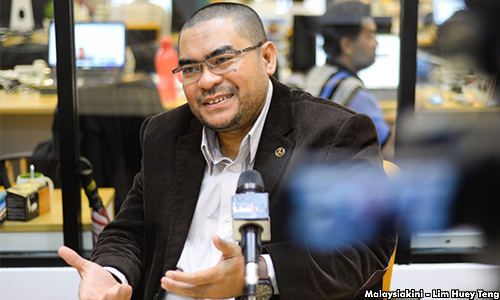
Parties that use race and religion as their raison d’etre are no longer pertinent, says Minister in the Prime Minister's Department for Religious Affairs Mujahid Yusof Rawa,
“Political parties that make use of religion or race are no longer relevant today. I stress the words 'make use of',” said the Amanah lawmaker in an interview with Malaysiakini.
“It's not that I reject Islam. But Islam is broad - it's not about whether it is used by a (political) party or not,” he said when asked about his views of certain parties, including PAS, that are viewed as extreme in wanting to step up religious punishments for offences.
The Parit Buntar MP and member of Pakatan Harapan's maiden cabinet said it is a misunderstanding that Islam is solely confined to party concerns.
“Islam is a way of life, it is faith. If Islam is only for a party's interests, and they use Quranic verses to shore up the party's claim it represents Islam, that is a misrepresentation,” he said, adding the religion's scope goes beyond just politics.
“We have to take Islam beyond politics. Islam is not partisan but is one of the major principles that guides us through life, including worship, way of life, nationhood, laws," said Mujahid, the son of former PAS president Yusof Rawa.
A former PAS lawmaker, Mujahid and the party's moderate faction quit the Islamist party three years ago after they were completely obliterated from the top leadership in a heated party election and formed Amanah.
PAS' ulama leadership has since taken to routinely attacking Amanah over the latter's Islamic credentials, particularly in the run-up to the May 9 general election.
'Islam as friendly, not fiery'
Asked about religious extremism in the country, Mujahid said the country needs to produce more preachers who understand Islam as a universal religion of peace.
In fact, he intends to create a guide for preachers who want to speak in mosques or in public spaces, so as not to spread hatred in the course of their service.
“For me, this is a challenge I am forced to face.
"That is why we will introduce a contest for preaching and cultivate preachers or group leaders among ustaz and ulama who can forward the idea of ‘rahmatan lil alamin’ (universal peace) so
that there is no room for extremism or Islamic terrorism.
“We want an Islam that is convivial, not confrontational,” he said.
Mujahid said while our ustaz’ standards may be high and they may be knowledgeable, they have to moderate their preaching methods and avoid using religious agencies “with the aim of hate
politics, racial tension in the name of religion, in the name of fatwa that are extreme.
“I will tackle this, insha-Allah," he vowed.
Shiites are 'M'sians too'
When asked whether Shiite adherents would enjoy protection from the new government, Mujahid said they have rights too as Malaysians.
Nevertheless, he asserted the country practices Islam in accordance with the Sunni school.
“Each individual has the right to choose his or her religion. This is enshrined in the constitution. Each citizen has freedom of religion.
“The country’s official religion is Islam in the constitution and there is freedom in its practice. Clauses about freedom of religion (in the constitution), I cannot deny those rights, (and) within that context.
In Malaysia, Shiites are considered adherents of a "deviant" sect. They are barred from promoting their faith to other Muslims but are free to practise it themselves.
“We adhere to the Sunni school of law, according to the teachings of Imam Syafie,” said Mujahid.
“Beyond that framework on (the practice) of Islam, whether the Shiite teachings conflict with Islam, that is an intellectual debate. As Malaysian citizens, they (Shiite adherents) are still entitled to that freedom.
“Unless they commit crimes that threaten the country’s stand on Islam, then action would be taken against that.” -Mkini


No comments:
Post a Comment
Note: Only a member of this blog may post a comment.